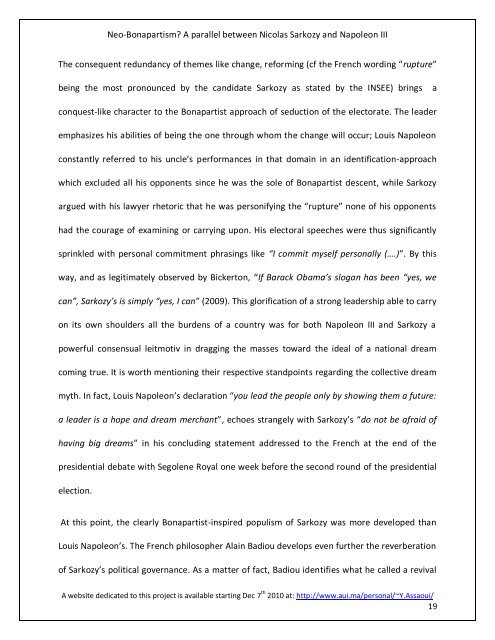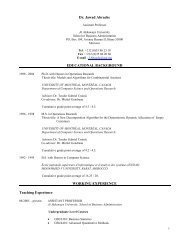Neo-Bonapartism? A parallel between Nicolas Sarkozy and ...
Neo-Bonapartism? A parallel between Nicolas Sarkozy and ...
Neo-Bonapartism? A parallel between Nicolas Sarkozy and ...
Create successful ePaper yourself
Turn your PDF publications into a flip-book with our unique Google optimized e-Paper software.
<strong>Neo</strong>-<strong>Bonapartism</strong>? A <strong>parallel</strong> <strong>between</strong> <strong>Nicolas</strong> <strong>Sarkozy</strong> <strong>and</strong> Napoleon III<br />
The consequent redundancy of themes like change, reforming (cf the French wording “rupture”<br />
being the most pronounced by the c<strong>and</strong>idate <strong>Sarkozy</strong> as stated by the INSEE) brings a<br />
conquest-like character to the Bonapartist approach of seduction of the electorate. The leader<br />
emphasizes his abilities of being the one through whom the change will occur; Louis Napoleon<br />
constantly referred to his uncle’s performances in that domain in an identification-approach<br />
which excluded all his opponents since he was the sole of Bonapartist descent, while <strong>Sarkozy</strong><br />
argued with his lawyer rhetoric that he was personifying the “rupture” none of his opponents<br />
had the courage of examining or carrying upon. His electoral speeches were thus significantly<br />
sprinkled with personal commitment phrasings like “I commit myself personally (….)”. By this<br />
way, <strong>and</strong> as legitimately observed by Bickerton, “If Barack Obama’s slogan has been “yes, we<br />
can”, <strong>Sarkozy</strong>’s is simply “yes, I can” (2009). This glorification of a strong leadership able to carry<br />
on its own shoulders all the burdens of a country was for both Napoleon III <strong>and</strong> <strong>Sarkozy</strong> a<br />
powerful consensual leitmotiv in dragging the masses toward the ideal of a national dream<br />
coming true. It is worth mentioning their respective st<strong>and</strong>points regarding the collective dream<br />
myth. In fact, Louis Napoleon’s declaration “you lead the people only by showing them a future:<br />
a leader is a hope <strong>and</strong> dream merchant”, echoes strangely with <strong>Sarkozy</strong>’s “do not be afraid of<br />
having big dreams” in his concluding statement addressed to the French at the end of the<br />
presidential debate with Segolene Royal one week before the second round of the presidential<br />
election.<br />
At this point, the clearly Bonapartist-inspired populism of <strong>Sarkozy</strong> was more developed than<br />
Louis Napoleon’s. The French philosopher Alain Badiou develops even further the reverberation<br />
of <strong>Sarkozy</strong>’s political governance. As a matter of fact, Badiou identifies what he called a revival<br />
A website dedicated to this project is available starting Dec 7 th 2010 at: http://www.aui.ma/personal/~Y.Assaoui/<br />
19

















